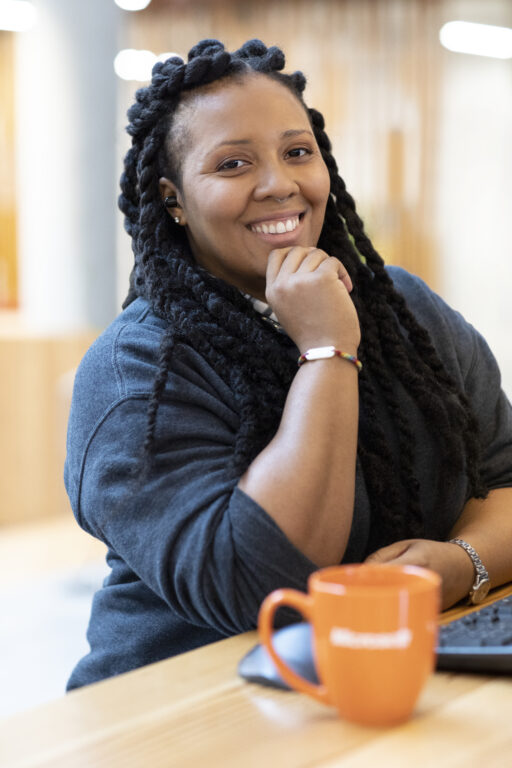Leveraging tech to create community
Value of a Veteran: Taking on Imposter Syndrome
We count on servicemembers to be confident and unafraid to move forward towards any challenge, which they are well trained to do.
When put into a technical training classroom for the first time, MSSA participants participants learn to problem-solve technical issues from the ground up, in fields that many have never dreamed of working. Graduates tell us that the program challenges everyone – even people who may have experience in IT.
Everyone starts on the same playing field and needs to work together to succeed.
In Camp Lejune-6 (CL-6)’s Cloud Application Development (CAD) cohort, a perfect storm was brewing. Career Development Manager (CDM) Rudy Gonzalez, a MSSA graduate himself, was at the helm of his 6thth cohort, responsible for the successful progress of 23 participants, most of whom had no prior technical experience.
“In my experience, imposter syndrome takes 85% of them,” said Rudy. While knowing the curriculum gets IT-novices career-ready, Rudy over time realized that insecurity and fear of failure was presenting a major obstacle to many in this promising cohort. “They think that since they’re new to tech, they come to the table without skills. They don’t recognize the relevance of the training the military gave them – to succeed on a shoestring, to lean on your buddies to get through together – and see the connection, the actual value of their experience, in any new field.”
Fortunately, Rudy’s military experience had prepared him ideally for just this situation. During his service as a Marine Gunnery Sergeant (E7), part of his role was to work with Marines providing motivation and guidance to fulfill their potential. For nearly his entire 20 years of service, Rudy specialized in persuading Marines to motivate themselves to thrive in a new and uncomfortable environment. From his own experience as an MSSA participant, he knew how to empower his cohort to build their own bridge to success.

“Beyond the technical training, what makes this program different is the transition element of professional development for veterans.
When you transition in MSSA, you get to actually sit there with a group of your peers, people that are in the same situation you are, with all different types of experience. You transition from duty together, learn from that group, and also have that space to realize your potential.”
Rudy Gonzalez, US Marine Corps veteran, MSSA Career Development Manager
Veteran talent in action: Find a problem, build a solution
First to recognize Rudy’s call to action and embrace the challenge of a new environment was Desi Blaney, then a transitioning Coast Guard Electronic Technician Second Class, who today works as a software engineer at Xbox. Rudy’s mentorship recalled her Coast Guard training and helped her lead the charge to master this new content, rather than succumb to intimidation and imposter syndrome.
“In the Coast Guard, even E1s knew how to lead. At any time, in any team, leadership can completely change – so everyone has to be able to play any part, at any time,” she said.
Leaning on her experience as a former Leadership and Team-building instructor, Desi got to work, seeking out the best resources and cheat-sheets, and creating her own where a gap was identified. “In the beginning we struggled to find our cadence. One of the misconceptions we had was that MSSA was a competition. It hindered us from learning. Most of us believed we didn’t have what it took to make it, ” she said.
As a group, CL-6 chose to use Discord as their source of communication. Once the MSSA Discord server was created, CL-6 was off to the races. “Instead of competing as individuals, we banded together as a unit that was bent on success,” Desi told us. “We were seen as unicorns to the other cohorts who were struggling with the online environment. We were a family. Once we all joined forces and started sharing resources on Discord, our cohort tackled every problem as a team.”
One Team, One Mission – the Not-So-Secret Unofficial MSSA Discord
Seeing how united her cohort was, Desi wanted to share that “One team” mentality with all of MSSA. With encouragement from her CDM, she initiated another Discord group for all cohort participants where resources and coding tricks were shared, calls for homework support were organized, and tips on how to take their learning into their own hands were passed on.
According to Johnny Jones Jr., then a participant and now a Service Engineer II with Microsoft, “We had a ‘calloused hands’ approach to work, where we all understood that we had to take our learning into our own hands and commit to our success here.”
One example of the commitment to learning shown by participants generates from the advice of Technical Mentors – Microsoft employees who volunteer their time to support MSSA participants in their tech skills. On Discord, participants discussed how the C# mentors from Microsoft had all encouraged them to learn other languages.
New gap? New solution! MSSA participants got to work cataloging resources for other coding languages, such as Python, that are not directly part of MSSA’s curriculum but can be helpful in different technical career paths. The approach is to learn the skills that can be applied to the industry in any coding language, and Discord enabled participants to leverage each others’ learnings for mutual success.
“We believe in One Team, One Mission. Until the last one of us gets across the line, we aren’t across the line,” Desi explained.
Deepening our ties – Building the MSSA Network
After 17 grueling weeks, when cohort CL-6 completed their training and graduated, the question was asked – “What do we do with the Discord – do we disband it?” The clear and resonating answer: “No way!” “These connections we formed working and problem-solving together had to stay,” said Johnny. “We couldn’t let this problem-solving super-machine for vets transitioning to tech disappear.”
While the cohort dissolved, the team that had developed under Rudy’s guidance evolved. As they transitioned again, from students to professionals, they did so as a team: They created new channels within the Discord server geared for networking – including occasional rants about the job application process, and other boons of the private sector that as servicemembers, they hadn’t faced before. The unofficial MSSA Discord evolved to include information for job seekers, job opportunities that might appeal to other graduates, and other resources that, as transitioned servicemembers entering tech, they knew would be helpful to their peers.
When the COVID-19 pandemic forced closures of usual business operations, and MSSA classrooms were moved to the virtual environment, Rudy’s cohort knew they had already developed the perfect tool to help the new cohorts of teammates they’d never met. Having just completed MSSA themselves, CL-6 understood the unique challenges transitioning servicemember face, and how to navigate MSSA for success. They continued to expand this toolkit to include resources for newly admitted MSSA participants – what to know, where to start. Johnny created a YouTube page, Military Transition Tips, where he shares ‘lessons from the road’ and offers mentorship and guidance to transitioning servicemembers wanting to get into the tech industry, through the MSSA program or another path to tech.
From its humble beginnings as a digital communications hub for the 23 members of CL-6, the unofficial MSSA Discord has been nurtured into an all-up support hub for our extended network of current participants, recent grads, and alumni who are now established in their tech careers and can offer mentorship and job opportunities.

“Most civilians struggle to understand the camaraderie within the military.
When you leave the military, the hardest struggle is knowing that you don’t have that support system anymore. I have seen so many good servicemembers end up homeless or in bad situations because of it. Through the discord and Vlogs we are able to expand that support system outside of the service and maintain the motto of one team, one fight.”
—Desi Blaney, US Coast Guard, MSSA graduate
Today the unofficial MSSA Discord server designed to support CL-6 hosts 74 active daily users, with 355 MSSA participants and alumni using it to stay connected. Just how good a tool is the Discord community for our MSSA network? According to Rudy, “This week, we found out someone from CL-6 just got a great job, and they came here to let us know, a year later.”
After mentoring nearly 3,000 veteran participants at the Microsoft Software & Systems Academy, we are more confident than ever: veterans represent the best in talent, in technical careers and private sector employment. Tools like Discord demonstrate the solution-driven problem-solving and outside-the-box thinking that characterizes veterans and how veteran talent creates value for their teammates and whole organizations.
Military experience successfully prepares veterans for careers in IT, pre-skilling them in many hard-to-cultivate traits critical for tech workers today. Veterans establish footing through continuous learning. They excel at building networks – at MSSA, supporting fellow cohorts as they transition into tech behind them, long after they’ve graduated. Through the struggles of transition, the MSSA network takes on imposter syndrome and finds strength in unity and upskilling together. This is the Spirit of Service that makes Veteran talent stand out in any hiring market.
+++++
Are you interested in transitioning to civilian life in an upcoming MSSA cohort?
Learn more by attending a Virtual Brief the first Tuesday of each month at 0900 PST/1200 EST, and again at 1200 PST/1500 EST. Register for an upcoming Virtual Brief by contacting [email protected], or watch a recent upload anytime on the Microsoft Military Affairs YouTube.
